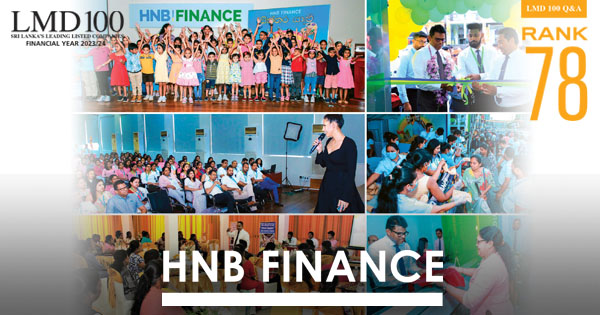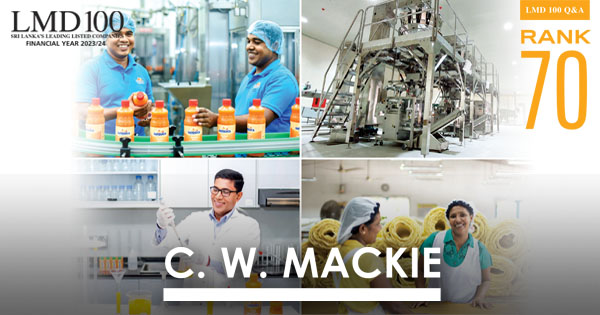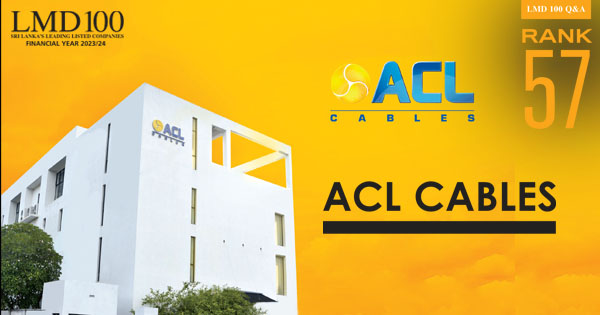HAYLEYS
LMD 100 Q&A
RANK 1
With robust frameworks in place, organisations across all sectors can maximise their potential and drive meaningful contributions to Sri Lanka’s overall development

Chairman
Chief Executive
Q: As Sri Lanka embarks on a fresh voyage in the context of its politics and the economy, how able or ready is the corporate sector for smooth sailing ahead while overcoming the ripples of past challenges?
A: The corporate sector is well prepared to leverage the evolving landscape to foster sustainable growth. We are optimistic about the government’s commitment to fostering a meritocratic system with a zero tolerance approach to corruption.
Corruption has systematically hindered the country’s progress, and addressing it can enable a more equitable environment for business. Moreover, by minimising wasteful expenditure, the government can ease the burden on both the private sector and society at large. In this collaborative environment, the government’s role should be supportive, prioritising competitive dynamics that allow the private sector to thrive. Measures such as strategic trade agreements, free trade zone (FTZ), comprehensive infrastructure, and competitive energy and input costs are essential to stimulate business growth and strengthen Sri Lanka’s competitiveness.
The corporate sector brings its expertise, resources and innovative strategies to the forefront, playing a crucial role in positioning Sri Lanka as a premier global tourism destination. By actively engaging in such efforts, businesses can significantly contribute to revitalising the nation’s tourism industry.
With robust frameworks in place, organisations across all sectors can maximise their potential and drive meaningful contributions to Sri Lanka’s overall development.
Q: What are your group’s main goals and objectives for financial year 2024/25?
A: Our purpose remains clear – to inspire an inclusive world and a thriving planet. This guides our strategic priorities for 2024/25, which focus on optimising our portfolio; prioritising customer-centricity; nurturing inspired teams; developing inclusive business models; and integrating environmental, social and corporate governance (ESG) principles at every level of our operations.
We are focussed on adding value to Sri Lanka’s raw materials, exemplifying our commitment to creating a value driven ecosystem. By maximising local resources, we help elevate industries while supporting sustainable growth.
Leveraging geopolitical shifts, and expanding logistics and trade partnerships are key priorities as we aim to strengthen our global footprint and create more integrated supply networks.
With the global shift towards renewable energy, we are expanding our clean energy capabilities. This aligns with both global decarbonisation trends and Sri Lanka’s need for sustainable energy sources.
Our commitment to ESG goals remains paramount. Through Hayleys Lifecode we are fostering a culture prioritising responsibility and resilience, ensuring we meet our sustainability commitments while enhancing value for all stakeholders.
Q: And what are the main challenges facing the sectors that your organisation is part of?
A: Our industry faces challenges that stem from regulatory and structural inefficiencies. The single borrower limit (SBL) within banking regulations restricts the ability of corporates to expand, which may curtail long-term growth potential and investment into the country.
Additionally, modernisation in critical government institutions such as the Inland Revenue Department (IRD) and Sri Lanka Customs is essential. Effective contributions from these institutions will create a more conducive environment for corporate expansion and sectoral growth.
Labour retention and skill shortages, exacerbated by the ongoing brain drain, are other pressing concerns. To counter these, we are focusing on creating inclusive work environments, developing talent pipelines and encouraging knowledge transfer to retain skilled professionals within the country.

Q: To what extent does your group harness technological advancements in its operations?
A: At Hayleys, next generation AI and digital transformation are essentials, not options. Digital transformation sits at the core of our strategy – with a dedicated team driving innovation across our diverse value chains.
Our digital journey extends to supply chain digitalisation with an emphasis on connecting with and supporting our smallholder networks. Integrating field sensors and precision agriculture practices empowers smallholders to optimise their operations, reduce reliance on agrochemicals and improve productivity. This approach contributes not only to the Hayleys ecosystem but also the wider economy.
Real-time data integration and digitalised pricing strengthen export competitiveness and enable agile decision-making, supporting our focus on achieving a sustainable competitive advantage.
We’re digitalising procurement, planning and payments, which enable efficiency gains. AI tools are also simplifying routine tasks, allowing teams to focus on strategic initiatives.
By driving digital transformation across the group, we can unlock valuable insights, drive efficiencies and foster a culture of innovation within Hayleys, ultimately benefiting both our ecosystem and the broader economy.
REVENUE (RS. M)
436,833
REVENUE CHANGE
(10)%
PROFIT AFTER TAX (RS. M)
14,847
PROFIT CHANGE
(46)%
TOTAL ASSETS (RS. M)
446,336
SHAREHOLDERS’ FUNDS (RS. M)
80,163
MARKET CAP (RS. M)
61,575
EARNINGS PER SHARE (RS.)
9.19
PRICE EARNINGS RATIO
8.94
EMPLOYEES
36,266
Telephone: 2627000: Email: info@cau.hayleys.com | Website: www.hayleys.com





